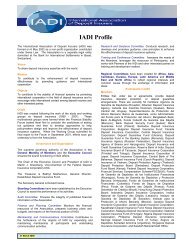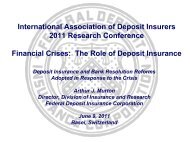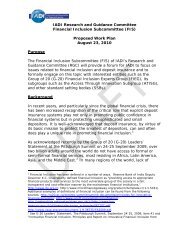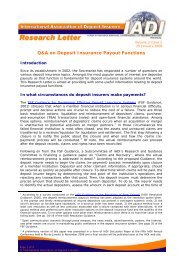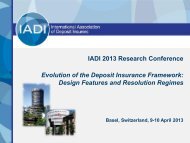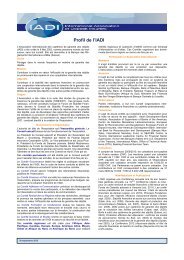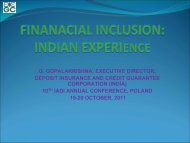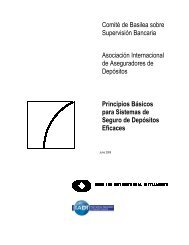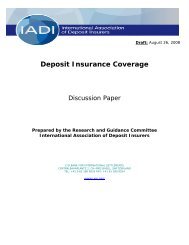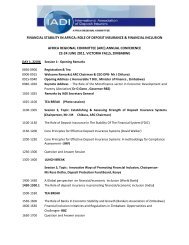Volume II - PDF - International Association of Deposit Insurers
Volume II - PDF - International Association of Deposit Insurers
Volume II - PDF - International Association of Deposit Insurers
- No tags were found...
Create successful ePaper yourself
Turn your PDF publications into a flip-book with our unique Google optimized e-Paper software.
•BACKGROUND DOCUMENTS•<br />
Part I: Research<br />
A variety <strong>of</strong> forms <strong>of</strong> governance can be utilised<br />
by a deposit insurance system. The choice <strong>of</strong> the<br />
governing structure usually is influenced by the<br />
mandate and the degree to which the deposit<br />
insurer is legally separate from the other safety-net<br />
participants.<br />
The composition <strong>of</strong> the governing body <strong>of</strong> a deposit<br />
insurance organisation should include individuals<br />
who understand the organisation’s activities and<br />
the environment in which it operates. These individuals<br />
should have decision-making authority.<br />
In addition, the input and views <strong>of</strong> the safety-net<br />
participants and/or relevant stakeholders <strong>of</strong>ten are<br />
taken into account by the governing body. The<br />
members should be subject to some form <strong>of</strong> a “fitand-proper”<br />
test, be free from serious conflicts <strong>of</strong><br />
interest, and be as independent as possible from<br />
undue political or industry influence.<br />
Governance systems can be enhanced through<br />
the use <strong>of</strong> sound strategic- and risk-management<br />
processes and good internal-control and audit<br />
systems. Arrangements should be made to ensure<br />
that the governing structure is accountable and<br />
transparent.<br />
Human resources are a critical element <strong>of</strong> the<br />
structure and organisation <strong>of</strong> a successful deposit<br />
insurance system. The ability to attract and retain<br />
qualified employees and establish competitive<br />
compensation are key challenges for most deposit<br />
insurers.<br />
A number <strong>of</strong> approaches have been used to ensure<br />
the availability <strong>of</strong> qualified persons to meet the<br />
operational objectives <strong>of</strong> deposit insurance schemes.<br />
Some deposit insurers rely primarily on a body <strong>of</strong><br />
dedicated staff, others emphasise the use <strong>of</strong> outsourcing,<br />
while still others utilise a combination<br />
there<strong>of</strong>. Country-specific factors, such as the mandate<br />
and structure <strong>of</strong> the deposit insurance system,<br />
as well as the availability <strong>of</strong> skilled resources,<br />
influence staffing decisions.<br />
Most deposit insurance systems need to rely on<br />
confidential information collected from institutions<br />
and other safety-net participants to fulfil<br />
their mandates. Thus, measures to ensure that this<br />
information is made available to the deposit insurance<br />
system and remains confidential are important.<br />
The lack <strong>of</strong> legal protection for employees can<br />
reduce incentives for deposit insurers to be vigilant<br />
in carrying out their mandates—particularly in<br />
cases where mandates emphasise early detection,<br />
intervention and closure <strong>of</strong> troubled institutions.<br />
The importance <strong>of</strong> statutory indemnification<br />
should be recognised and employees should<br />
receive legal protection against lawsuits for their<br />
action in the normal course <strong>of</strong> deposit insurance<br />
activities or supervision.<br />
The ability to have in place information management<br />
systems to access and process information<br />
quickly and accurately is vital for a deposit insurer<br />
to detect and deal effectively with problems.<br />
Endnotes<br />
1 The Subgroup is comprised <strong>of</strong> representatives from<br />
Philippines (coordinator), Canada, Germany, Jamaica,<br />
and The World Bank. This paper is designed for<br />
deposit insurance practitioners and other interested<br />
parties. It is primarily based on the judgment <strong>of</strong> the<br />
Working Group members and the experiences <strong>of</strong><br />
various countries that have addressed structure and<br />
organisation issues for deposit insurance systems.<br />
The paper also incorporates use <strong>of</strong> the available<br />
literature on the subject.<br />
2 The issue <strong>of</strong> powers is discussed in another paper.<br />
3 A number <strong>of</strong> privately administered systems have<br />
restricted their stated objectives and mandates to<br />
providing deposit insurance solely for protecting<br />
small and unsophisticated depositors.<br />
4 There can be disadvantages associated with having<br />
too many characteristics <strong>of</strong> a system defined in law<br />
or private contracts. In some countries, operational<br />
features, such as staffing levels and budgets, are<br />
established by statute, which may diminish the flexibility<br />
<strong>of</strong> the deposit insurance system to respond to<br />
changing conditions.<br />
5 For a more detailed discussion <strong>of</strong> how coordination<br />
can be accomplished please refer to the paper on<br />
interrelationships.<br />
84<br />
Guidance for Developing Effective <strong>Deposit</strong> Insurance Systems: <strong>Volume</strong> <strong>II</strong>



